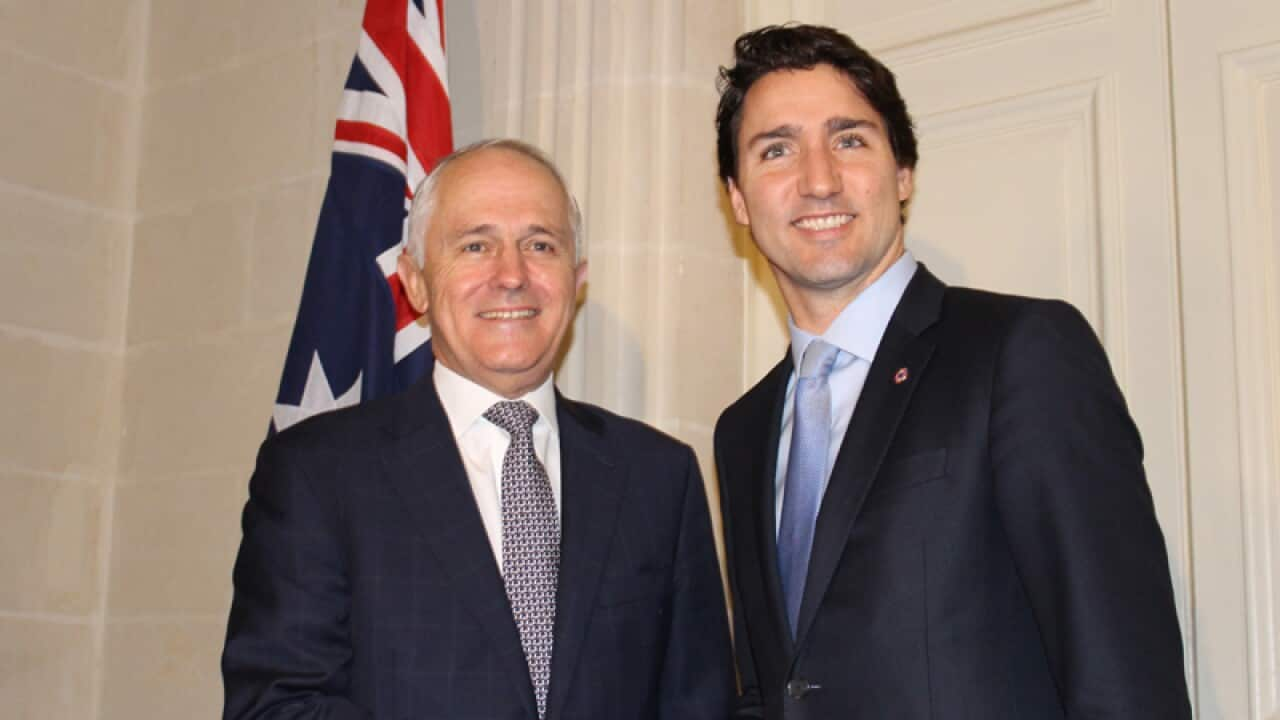One in four of Australia’s overall population were born overseas; 46 per cent have at least one parent who was born overseas; and nearly 20 per cent of Australians speak a language other than English at home. Australians come from 200 countries, speak over 300 languages at home and belong to more than 100 different religious groups.
This cultural diversity is not yet represented in our state and national parliaments. Pauline Hanson and her One Nation party may only represent the views of a small number of Australians, but we need the voices of multicultural Australia properly reflected through our leaders.
Canada is setting the benchmark
When it comes to multicultural representation and leadership in politics, Canadian Prime Minister Justin Trudeau leads the way in the Western world.
The 2015 federal Canadian election saw the successful election of 20 Sikh-Canadian MPs and first-ever MPs of Afghan, Somali and Iranian heritage.
Perhaps the most remarkable recognition of the Canadian multicultural community’s contribution to Canada shown by Trudeau is the appointment of four Sikh-Canadian MPs and a former Afghani refugee to his cabinet.
Indeed, Trudeau has proudly stated that ““I have more Sikhs in my cabinet than Modi does.” Indian Prime Minister Narendra Modi only has two Sikh cabinet ministers serving in his government.
Asked why he chose such a diverse cabinet, Trudeau responded: “It’s important to be here before you today to present to Canada a cabinet that looks like Canada.”
The Canadian parliament is currently the most diverse in the country’s history with more women, multicultural, interfaith and First Nation MPs elected in 2015.
Trudeau proudly promotes Canada’s diversity as a source of strength during his overseas visits and commits to building on it through policies and legislation.
Having multicultural representation in the national parliament increases the interest and participation of multicultural communities in politics.
For example, Canadian-Afghan MP Maryam Monsef continues to support initiatives in her home country of Afghanistan such as her role in co-founding the Red Pashmina campaign, which has raised $150,000 to fund education and maternal health programs for women and girls.
Newly elected Canadian-Somali MP Ahmed Hussen, who arrived in Canada in 1993, continues to voice the concerns of the Canadian Somali community in the House of Commons. Hussen’s successful election has also prompted the Canadian Somali community to be more politically active in Canada.
Australia has a lot of catching up to do
Despite Australians coming from extremely diverse ethnic, cultural and religious backgrounds, that diversity is largely absent from its state and national parliaments, and especially from the senior ranks of parliamentarians.
There are however, some exceptions such as Penny Wong, Ed Husic and Lisa Singh. The successful election and the contribution of these parliamentarians have inspired many multicultural Australians, including myself, to get involved in politics.
Labor’s Anne Aly has declared victory in the West Australian seat of Cowan. In addition to being a successful academic and counter-terrorism expert, Aly is set to become the first Muslim woman to be elected to federal parliament.
For many Australian-Muslim women, this outcome represents a significant historical achievement because there is now a parliamentarian serving in the Australian parliament who they can relate to and who possesses a deep understanding and knowledge of their community’s needs and aspirations.
Increasing multicultural representation
During the 2016 federal election, the ALP announced a number of policies and new funding commitments to advance multiculturalism. A Bill Shorten Labor Government promised to provide $80 million of new funding in areas such as language services, employment, workplace diversity, access and equity, community infrastructure, cultural programs, policy development and a culturally and linguistically diverse (CALD) aged care fund.
These commitments represented for the first time that a major political party outlined detailed policy commitments to undertake a whole of government approach for multiculturalism in Australia.
In August last year, I co-founded with fellow Australian Labor Party (ALP) member Wesa Chau a new organisation called Poliversity.
The objective of Poliversity is to advocate for multicultural leadership and representation within the ALP to achieve a more balanced and equitable representation that reflects the multicultural makeup of Australia.
Having equal representation in parliaments ensures the views and concerns of multicultural Australians are heard and considered.
Political parties in Australia need to do better than just connect with multicultural communities during election campaigns. They need to display real leadership to ensure our parliaments reflect the modern Australia. To achieve this, political parties need to take multicultural representation more seriously – and it starts by having leadership from the very top.
Jieh-Yung Lo is the co-founder of Poliversity.
This article was co-published with the University of Melbourne’s Election Watch.

